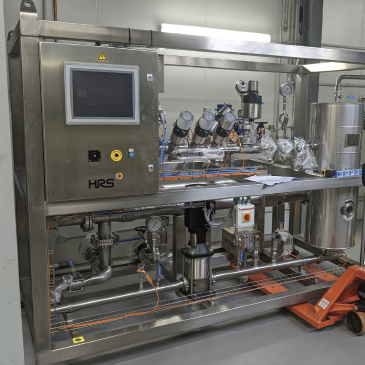Mayne Pharma, a listed Australian company, commercializes branded and generic pharmaceuticals in a range of product areas. Its GMP accredited manufacturing facility is located in Salisbury, South Australia, approximately 12 miles from Adelaide, where it produces tablets, capsules, liquids, and creams.
Capsules are a popular method of drug delivery, comprising of two-piece dissolvable outer shell containing miniature pellets which carry the active ingredients. The pellets are prepared using a fluid bed dryer in order to reduce moisture content and are sometimes spray-coated with a solution containing key ingredients. The spray-coating solutions use an alcohol-based formulation to ensure correct mixing and maintenance of the fundamental chemical properties. The solutions must be prepared and applied within a tight temperature range.
STRIKING THE RIGHT BALANCE

Mayne Pharma wanted to expand and upgrade its existing production capacity for capsule production by adding a third fluid bed dryer and the associated equipment, while simultaneously improving temperature regulation to its existing lines. HRS Heat Exchangers was asked to provide a quotation for a hot water heater to support the new line, but quickly realized that a turnkey package offering active heating or cooling as required would provide a much better solution.
“The alcohol for the solutions is drawn from our outside tank farm,” a spokesperson for Mayne Pharma explains. “One of the issues with the old systems was that on hot days the factory had to wait for the alcohol to cool down before mixing the solutions, which could sometimes take hours. The HRS solution means that we can actively cool it if we need to. Alternatively, if we bring in the alcohol on a cold day, we can heat it up, as necessary.”
The solution produced by HRS is a heater/cooler with the ability to reduce hours of cooling time to less than sixty minutes. Due to space constraints in the existing factory and the requirement to connect various pieces of equipment, the unit was supplied on a compact skid with integrated controls and automation of both heating and cooling processes. Other challenges faced by HRS Engineers were uncertainties about heat transfer in the existing tanks and having to overcome unknown pressure losses in a small jacket annulus which would otherwise affect the performance of the unit.
K-SERIES: UP CLOSE
The HRS unit utilizes two K Series multi-pass corrugated tube heat exchangers to maintain solvent temperature at 77 or 86 degrees Fahrenheit (25 or 30 degrees Celsius) as required. The hot water loop is composed of one heat exchanger, a centrifugal pump, safety features, and the necessary ancillaries such as a pressure gauge, temperature transmitter and manual valves.
The service water is recirculated in a closed loop with the selected solution tank to heat the solvent from 59 degrees Fahrenheit (15 degrees Celsius) to the target temperature.
The process is controlled by temperature transmitters and an autonomous control system and given the importance of the temperature in the process; product temperature is also monitored via a secondary control loop with transmitters located on each solution tank.
Moreover, the cooling section is designed to maintain the product temperature at the targeted set point. Incoming service water from a buffer tank is cooled using chilled water at 42 to 50 degrees Fahrenheit (5.5 to 10 degrees Celsius) from elsewhere in the factory using several passes through the second heat exchanger.
The tank jacket service water is recirculated in a closed loop with the selected solution tank to cool the solvent from 104 degrees Fahrenheit (40 degrees Celsius) to the target set temperature of 77 or 86 degrees Fahrenheit (25 or 30 degrees Celsius). Again, temperature transmitters control the process via an autonomous control loop.
HELP ON SITE AND WORLDWIDE
Despite the COVID-19 pandemic, the process of manufacturing, installing, and commissioning the unit ran smoothly, taking less than six months from the order being received to the unit being fully operational.
“COVID-19 meant that we weren’t able to undertake Factory Acceptance Testing (FAT) at HRS’s manufacturing facility in Spain, but as it was such a straightforward job, we wouldn’t have insisted on this anyway,” says the spokesperson. “We undertook the commissioning on site with remote support from HRS’s engineer in Melbourne, but apart from a couple of phone calls nothing else was required.”
FOR MORE INFORMATION
Ella Taghavi is technical sales engineer at HRS Heat Exchangers. Located in Atlanta, Georgia, HRS Heat Exchangers is part of the HRS Group which operates at the forefront of thermal technology, offering innovative heat transfer solutions worldwide across a diverse range of industries. With forty years’ experience in the pharmaceutical sector, specializing in the design and manufacture of an extensive range of turnkey systems and components, incorporating our corrugated tubular, and scraped surface heat exchanger technology, HRS units are compliant with global design and industry standards. For more information, visit www.hrs-heatexchangers.com.
MODERN PUMPING TODAY, November 2022
Did you enjoy this article?
Subscribe to the FREE Digital Edition of Modern Pumping Today Magazine!


